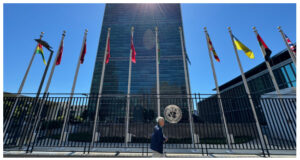The United States has expressed its disapproval of Nigeria’s ban on a wide range of imported goods, stating that it not only hinders American exports but also exacerbates trade tensions between the two countries.
The U.S. Trade Representative (USTR) has included the restrictions, which affect items such as beef, poultry, fruit juice, pharmaceuticals, and spirits, among the top ten unfair trade practices imposed by foreign nations.
This ban, which covers 25 product categories, includes significant U.S. export interests, including agricultural products like beef, poultry, and pork, as well as pharmaceuticals, fruit juice, and alcoholic beverages.
In a post on its official X account, the USTR stated: “These policies create significant trade barriers that lead to lost revenue for U.S. businesses looking to expand in the Nigerian market.”
Nigeria joins a list of countries, including India, Thailand, Kenya, Algeria, and the European Union, which the U.S. accuses of maintaining restrictive policies that prevent billions of dollars in potential American exports.
The USTR noted the negative impact this ban has on U.S. businesses, particularly those in agriculture, healthcare, and consumer goods.
The ban directly affects U.S. exporters of agricultural goods like meat and poultry, as well as processed products such as fruit juice and alcoholic drinks.
Pharmaceuticals and medicaments, which are also on the list, reduce opportunities for U.S. healthcare companies trying to enter or grow in Nigeria.
“These policies not only reduce export opportunities but also undermine the global competitiveness of U.S. industries,” the USTR added.
In a related development, the U.S. implemented reciprocal tariffs on several countries, including Nigeria, on Wednesday.
Washington imposed a 14% tariff on Nigeria’s exports, although President Bola Tinubu’s administration has chosen not to retaliate.
Commenting on this, Senior Market Analyst at FXTM, Mr. Lukman Otunuga, stated that it remains unclear whether the Nigerian government’s decision to refrain from retaliation was a strategic move to prevent further tariffs from the U.S.
In his statement, Otunuga explained: “Nevertheless, these tariffs may impact growth, considering that Nigeria’s exports to the U.S. typically range between $5-6 billion annually.”
“While one could argue that Nigeria is somewhat insulated due to the fact that over 90% of its exports are crude oil and gas products, growing concerns surrounding the U.S.-China trade war and its potential to push the global economy into a recession present significant risks for emerging markets,” he added.
Furthermore, Otunuga pointed out that Nigeria remains vulnerable to fluctuating oil prices.
Last week, Brent and WTI crude experienced their steepest weekly losses in over a year.
Oil prices are under pressure due to ongoing trade tensions and a large supply boost announced by OPEC+. As a result, crude oil has dropped over 13% this month, bringing year-to-date losses to nearly 15%.
This decline in oil prices could complicate the Nigerian government’s ability to implement its 2025 budget, which was based on oil prices of $75 per barrel.
“The sharp sell-off in oil prices could lead to further challenges for the Naira, which has already been one of the worst-performing emerging market currencies. The Naira has depreciated by 4% against the dollar year-to-date and could face additional losses if lower oil prices result in falling foreign exchange reserves,” Otunuga warned.
Regarding inflation, Nigeria is set to release its latest inflation figures in mid-April.
The annual inflation rate fell to 23.2% in February, the lowest level since June 2023, while food inflation also decreased to 23.5%, its lowest since September 2022.
Otunuga noted that while this drop in the Consumer Price Index (CPI) is partly attributed to a technical adjustment, further signs of cooling price pressures could spark discussions about potential rate cuts by the Central Bank of Nigeria (CBN) in the second half of 2025.

















